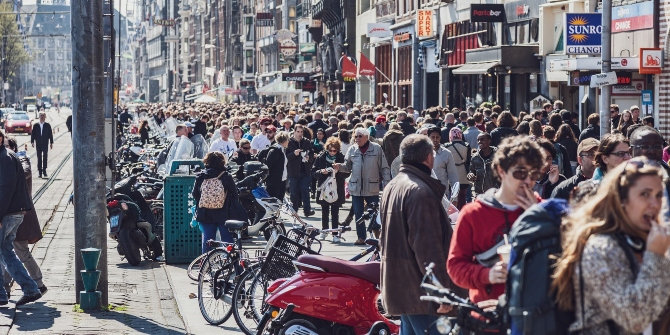In 2011, a state visit by Queen Elizabeth II to Ireland was hailed as a watershed moment for UK-Irish relations. Darren Litter writes that while the event was highly symbolic, the EU had helped facilitate contact between the Irish government and the royals as far back as the 1970s.
It is now ten years since Queen Elizabeth II’s historic state visit to Ireland in 2011 – the first visit by a ruling monarch since the Irish state’s formation in 1921. The visit is widely regarded as a watershed moment in the growing rapprochement between the UK and Ireland prior to Brexit. The Queen herself reportedly even described it as “the very best ever state visit” she had ever been on.
It is important to remember, however, that Irish efforts to foster better relations with the British royal family date back to 1977. In June of that year, the Fine Gael-Labour coalition led by Taoiseach Liam Cosgrave ended the official boycott on royal occasions that had been in place since the inception of the state. This allowed for the then foreign affairs minister Dr Garret FitzGerald to attend a Silver Jubilee service and reception at St. Patrick’s Cathedral, Dublin; as well as a letter by President Patrick Hillery wishing the Queen a “happy occasion” and “sincere felicitations”.
Following the UK’s departure from the European Union, it is even more important to remember that the first opportunity for meaningful in-person contact between the Irish government and the royal family came as a result of shared UK-Irish membership of the EU. At the end of June 1977, the European Council held a summit in London – the most significant political outcome from which was that the member states defined the task of settling outstanding issues at lower levels as a core function of the Council. Arguably the more noteworthy feature of the meeting, however, was that rather than the routine luncheon that typically followed summits, the Council was instead invited to Buckingham Palace for a dinner celebrating the Silver Jubilee.
With tensions in the British and Irish Isles being very high, the remarkable nature of this was apparent to FitzGerald, with the future Taoiseach later admitting that while on the lawn of Buckingham Palace he could not help but think of the Reverend Ian Paisley and what he might have made of it. The royals themselves were clearly unconcerned by unionist attitudes, as during the tattoo that accompanied the dinner, Prince Charles approached FitzGerald, asking him what he recounted as a series of “highly significant questions about Northern Ireland”. The Queen Mother then asked FitzGerald for his company, and the two were then joined by the Queen herself who was afterwards said by the British Prime Minister James Callaghan to have been looking for FitzGerald to “discuss Northern Ireland”.
There is no prospect of a serious relationship with the British state without due respect to the royal family, and the EU provided a pretext for this that would safeguard the Irish government against its cynical exploitation by the Provisional Republican Movement (PRM). Indeed, the extremes in Northern Ireland – as FitzGerald’s thoughts about Paisley illustrate – were completely unaware of this deeply important breakthrough in the UK and Irish relationship. This was something that the UK and Ireland would replicate effectively in the negotiations of 1985-98; continually withdrawing to the European Council setting for its privacy and informality.
FitzGerald’s visit to Buckingham Palace – a move the Irish President would only make some 16 years later – engendered a sense of profound trust from the British state. This was reflected in the “hope of an improvement” Lord Robin Renwick attributes to the British upon FitzGerald’s return to the Office of Taoiseach in 1982. UK elites saw him as somebody to do business with, as highlighted by the fact that the 1985 Anglo-Irish Agreement was essentially the product of British civil servants persuading Prime Minister Margaret Thatcher of the case made by FitzGerald and his officials.
Without the opportunity for discrete contact provided by the framework of EU activity, it is hard to see how an Irish minister could have engaged in the vital confidence-building actions that FitzGerald did. The security situation in the 1970s and 80s dictated that an Irish-based meeting could not take place; as was encapsulated in the 1979 Provisional IRA killing of Lord Mountbatten in Sligo. The Irish government, equally, could not have been seen to pursue such relations bilaterally in the “old imperial capital”, as doing so would have risked a dangerous propaganda coup for the PRM (according to 1986 Irish state papers).
FitzGerald thanked the Queen for the hospitality she had shown him when they met a further time in 1986 – again at Buckingham Palace due to the occasion of a European Council summit. UK-Irish relations were on a new footing then, with the Anglo-Irish Agreement heralding an era in which the UK and Ireland would increasingly approach the Northern Ireland issue as intergovernmental partners. When FitzGerald passed away in 2011 – coincidentally during the time of the Queen’s visit – the Queen expressed her sadness, paying tribute to him as a “true statesman” who “made a lasting contribution to peace and will be greatly missed”.
Note: This article gives the views of the author, not the position of EUROPP – European Politics and Policy or the London School of Economics. Featured image credit: Óglaigh na hÉireann / Irish Defence Forces (CC BY-NC 2.0)






Interesting.